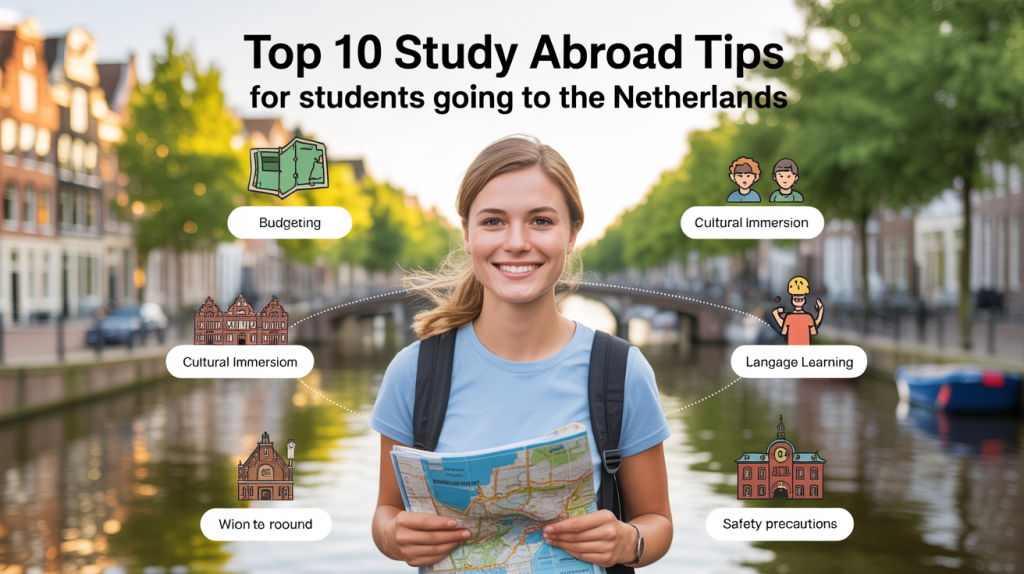Top 10 Study Abroad Tips for Netherlands-Bound Students
- 1. Explore Your Study Options Thoroughly
- 2. Choose the Right University and City
- 3. Understand the Application Procedures
- 4. Budget and Finance Your Studies
- 5. Prepare for a Multicultural Environment
- 6. Arrange Accommodation Early
- 7. Sort Out Your Visa and Residence Permit
- 8. Get Health Insurance
- 9. Learn the Basics of Dutch Life
- 10. Maximise Your Career Opportunities
1. Explore Your Study Options Thoroughly
The Netherlands offers a broad spectrum of English-taught programmes across its two main higher education sectors:
- Research Universities (WO): Emphasize academic and scientific skills oriented towards research careers and theoretical knowledge.
- Universities of Applied Sciences (HBO): Focus on practical skills and professional training, preparing students directly for specific careers.
Understanding the distinction between these two types of institutions is essential for aligning your study choices with your career aspirations and preferred learning styles.
For detailed information about programmes and institutions, visit our Study Options in the Netherlands.
2. Choose the Right University and City
Every Dutch university has its own areas of expertise, and the cultural atmosphere of cities varies significantly:
- Top cities with higher living costs: Amsterdam, Rotterdam, The Hague, Utrecht (Randstad area)
- More affordable student cities: Tilburg, Enschede, Wageningen, Eindhoven, Groningen
Living expenses including accommodation, transportation, and daily costs fluctuate depending on location. It’s essential for students and recruiters alike to factor this into their planning process.
To deepen your knowledge of university specializations and city profiles, see our guide on Universities and Cities in the Netherlands.
3. Understand the Application Procedures
Successful application management is critical for international admissions teams and recruitment agents.
Most study programmes require registration and application through Studielink, the official Dutch higher education application portal. The process includes:
- Preparing necessary documents in advance (transcripts, motivation letters, language certificates)
- Following strict deadlines and submission requirements
- Monitoring application status regularly for updates
Learn more about application steps and requirements at How to Apply.
4. Budget and Finance Your Studies
Though Dutch universities offer relatively affordable tuition compared to other Western countries, students must budget carefully:
- Tuition fees: Vary by programme and institution
- Cost of living: Rent, food, transport, and personal expenses
- Financial aid: Scholarships, grants, and part-time work opportunities
Encouraging students to research scholarships early or explore part-time employment options improves their financial preparedness and reduces stress.
Detailed financial advice and scholarship listings can be accessed at Tuition Fees and Scholarships.
5. Prepare for a Multicultural Environment
The Netherlands hosts a vibrant international student community, fostering an inclusive and open-minded environment.
- Students will interact with peers from diverse cultural backgrounds.
- Universities offer intercultural training and support services.
- Social activities encourage integration and language practice.
Explore cultural and social opportunities at Student Life in the Netherlands.
6. Arrange Accommodation Early
Finding suitable student housing is a common challenge, especially in major cities where demand exceeds supply.
Tips for securing accommodation:
- Start your housing search immediately after acceptance.
- Utilize university housing offices or official platforms.
- Consider private rentals as alternatives.
For housing options and support, visit Accommodation in the Netherlands.
7. Sort Out Your Visa and Residence Permit
Non-EU/EEA students must obtain a visa and residence permit before arrival.
Key steps include:
- Verifying visa eligibility and required documentation.
- Submitting applications on time.
- Coordinating with universities for official invitation letters and guidance.
See comprehensive visa information at Visa and Immigration.
8. Get Health Insurance
Health insurance is mandatory for all students in the Netherlands.
Suggestions for approaching this requirement:
- Check if home-country insurance covers international studies.
- Acquire Dutch health insurance if necessary.
- Rely on university advice regarding approved policies.
Our health insurance resource is available at Health Insurance for Students.
9. Learn the Basics of Dutch Life
While English is widely spoken, gaining familiarity with Dutch culture improves students’ daily experience.
Important aspects include:
- Learning basic Dutch phrases.
- Understanding local etiquette and customs.
- Adapting to public transportation and the extensive cycling culture.
- Embracing safety and community norms.
For cultural insights and tips, visit Living in the Netherlands.
10. Maximise Your Career Opportunities
The Netherlands offers strong career support for international students:
- Universities maintain close industry links for internships and projects.
- International graduates benefit from favourable post-study work permits.
- Career services provide counselling, workshops, and networking.
Explore career guidance and post-study opportunities at Career Services.
Why Partner with Study in Netherlands?
As a leader in international recruitment and education, Study in Netherlands offers:
- Comprehensive, up-to-date information for students, recruiters, and universities.
- Expert support in admissions and visa guidance.
- Tailored marketing solutions to attract global talent.
Working with us ensures your institution or agency stays at the forefront of international education trends.
Take the Next Step with Study in Netherlands
Are you ready to enhance your recruitment strategy and provide international students with unmatched guidance on studying in the Netherlands?

